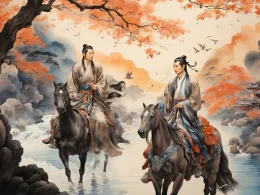The east and west are joined by boundless water clear;
On the endless spring river goes the boat you steer.
Where will you moor it at sunset far, far apart?
Can I not gaze far, far away with broken heart!
Original Poem:
「送杜十四之江南」
孟浩然
荆吴相接水为乡,君去春江正渺茫。
日暮征帆何处泊?天涯一望断人肠。
Interpretation:
This poem was written by the Tang Dynasty poet Meng Haoran as a farewell to his friend Du Huang, who was about to leave the Jing region for Eastern Wu. Meng Haoran expressed his deep sorrow and sense of loss during their separation. Through the interweaving of landscapes and emotions, the poem reveals the complex emotions associated with bidding farewell.
- First Two Lines:
"The river that connects Jing and Wu is our hometown, you are leaving, and the spring river stretches endlessly."
These lines describe the river linking the regions of Jing and Wu, highlighting their close connection, as well as the sadness of departure. The spring river serves as both a natural image and a metaphor for the poet's sense of loss, emphasizing the infinite expanse and emptiness that fills the poet's heart. - Middle Two Lines:
"At dusk, where will the departing boat stop? In the distance, the horizon breaks, and my heart tightens."
These lines convey the dilemma of parting through the image of a boat seeking a place to anchor at dusk. The contrast between the distant horizon and the poet's inner pain symbolizes the painful separation and the inability to keep the friend from leaving.
Writing Features
- Fusion of Landscape and Emotion
The poem skillfully combines the description of nature with the poet's personal feelings. The spring river scene and the distant horizon serve as mirrors to Meng Haoran's emotions, amplifying the depth of his sorrow. - Elevation of Emotions Through Contrast
Through subtle contrasts, such as the softness of the river and the bitterness of parting, the poem enhances the internal tensions of the poet. The evocation of the distant horizon and the "breaking heart" deepens the emotional intensity. - Gradual Evolution of Emotion
The poem starts with a gentle description of nature and then reveals the growing emotion, culminating in the final line, where the pain is fully expressed. This process illustrates the emotional development throughout the poem.
Overall Appreciation
Through vivid natural scenes, the poem poignantly expresses Meng Haoran's emotions, showing the internal conflict caused by the separation from his friend. The first two lines evoke a sense of loss, while the following lines, with the boat departing, highlight the poet's anxiety and reluctance to say goodbye. The contrast between the distant horizon and the emotional intensity created by the separation builds tension, pushing the sadness to its peak. In the final line, the poem reaches its emotional climax, representing an indescribable pain in the face of inevitable separation.
Insights
The Art of Farewell
The poem underscores the complexity of farewells, showing how even a simple separation can trigger a wide range of emotions, from melancholy to pain. What is precious in this poetry is its ability to capture all the emotional richness that comes with the act of saying goodbye.
Using Landscape to Express Emotions
This poem teaches the importance of combining nature and personal feelings in writing. By describing the landscape in detail, one can not only make the atmosphere more vivid but also enrich the depth of the emotions expressed.
Gradation of Emotion in Writing
Through the gradual escalation of emotions, this poem shows how to build emotional intensity in writing, where each step leads to an intensification of the feeling.
Poem translator:
Xu Yuan-chong (许渊冲)
About the poet

Meng Haoran (孟浩然), 689 - 740 AD, a native of Xiangyang, Hubei, was a famous poet of the Sheng Tang Dynasty. With the exception of one trip to the north when he was in his forties, when he was seeking fame in Chang'an and Luoyang, he spent most of his life in seclusion in his hometown of Lumenshan or roaming around.












